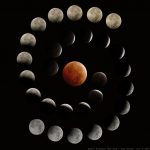 The first eclipse this year occurs on January 31. This will be the most significant eclipse of the year in North America, as it is the only one visible here this year. It’s also a total eclipse in certain parts of the world. The Moon will be full in Cancer in the constellation or nakshatra of Ashlesha for the January 31, 2018 lunar eclipse. This full Moon is known as Magh Purnima in Vedic astrology or Jyotish.
The first eclipse this year occurs on January 31. This will be the most significant eclipse of the year in North America, as it is the only one visible here this year. It’s also a total eclipse in certain parts of the world. The Moon will be full in Cancer in the constellation or nakshatra of Ashlesha for the January 31, 2018 lunar eclipse. This full Moon is known as Magh Purnima in Vedic astrology or Jyotish.
In close proximity to the full Moon will be North node Rahu. The Sun, South node Ketu, Venus and Mercury will be opposite the Moon in Capricorn.
 The symbol of Ashlesha is a coiled snake. Ashlesha is known in Western astronomy as Epsilon Hdyra. Hydra is a water snake. Ashlesha is composed of six stars that form a hexagon that resembles a serpent’s head. The deity of Ashlesha is the Sarpas or the Nagas. The Nagas were half serpent and half human. Ga means “to go” and is connoted with the senses. Adding the prefix “Na”, Naga translates as “to not go”. Snakes have the ability to go where others can’t. The Sarpas were courageous and strong. People who are born with their Moon or rising sign in Ashlesha have very keen senses and are quite perceptive and intuitive. During the January 31, 2018 lunar eclipse, your perception and insights may be occluded as the Moon will be veiled by the shadow of the nodes. Therefore, it’s not the time to rely on your instincts.
The symbol of Ashlesha is a coiled snake. Ashlesha is known in Western astronomy as Epsilon Hdyra. Hydra is a water snake. Ashlesha is composed of six stars that form a hexagon that resembles a serpent’s head. The deity of Ashlesha is the Sarpas or the Nagas. The Nagas were half serpent and half human. Ga means “to go” and is connoted with the senses. Adding the prefix “Na”, Naga translates as “to not go”. Snakes have the ability to go where others can’t. The Sarpas were courageous and strong. People who are born with their Moon or rising sign in Ashlesha have very keen senses and are quite perceptive and intuitive. During the January 31, 2018 lunar eclipse, your perception and insights may be occluded as the Moon will be veiled by the shadow of the nodes. Therefore, it’s not the time to rely on your instincts.
 Ashlesha is also connoted with the kundalini shakti, the spiritual energy which lies dormant at the base of the spine. It lies like a coiled snake until it is properly awakened by a Guru. Hence, the January 31, 2018 lunar eclipse can actually be a powerful time for spiritual practices.
Ashlesha is also connoted with the kundalini shakti, the spiritual energy which lies dormant at the base of the spine. It lies like a coiled snake until it is properly awakened by a Guru. Hence, the January 31, 2018 lunar eclipse can actually be a powerful time for spiritual practices.
Vedic astrology and eclipses
Typically, Vedic astrology advises that eclipses are times for inwardly directed activity and not for gazing at the Sun or Moon. A lunar eclipse is known as a Chandra grahan in Hindi. It is also suggested that you stay inside. New undertakings should be avoided 3 days before the January 31, 2018 lunar eclipse. Additionally, for the next 6 months, each time that the Moon is in Ashlesha, you should not commence any new ventures.
While many people in the Western hemisphere intentionally view eclipses, this is never recommended in the tradition of Vedic astrology. Those who do look at them may suffer from greater difficulty in the future. The mythology related to the nodes, Rahu and Ketu, can help explain why eclipses are considered as inauspicious events. What follows is a very simplified version of the tale of the nodes.
The story of Rahu and Ketu
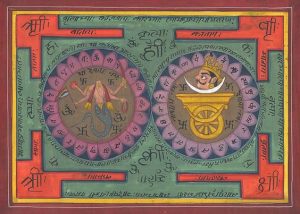 The nodes were initially embodied in a demonic form. They desired immortality. One demon heard of a private gathering where the Gods were imbibing amrita, the nectar of immortality. He so desired to join the party that he donned a disguise and gained admittance. The amrita was passed around a dining table. The demon tasted it, squealed with delight, but was then discovered by the Sun and the Moon, who were seated on either side of him. A God threw a discus and chopped the demon into two halves: the head (Rahu) and the tail (Ketu). Having tasted the nectar of immortality, Rahu is forever questing for that elixir and is never satiated. Ketu is constantly trying to stay grounded. The nodes are also considered as inimical to the two luminaries who discovered his trickery.
The nodes were initially embodied in a demonic form. They desired immortality. One demon heard of a private gathering where the Gods were imbibing amrita, the nectar of immortality. He so desired to join the party that he donned a disguise and gained admittance. The amrita was passed around a dining table. The demon tasted it, squealed with delight, but was then discovered by the Sun and the Moon, who were seated on either side of him. A God threw a discus and chopped the demon into two halves: the head (Rahu) and the tail (Ketu). Having tasted the nectar of immortality, Rahu is forever questing for that elixir and is never satiated. Ketu is constantly trying to stay grounded. The nodes are also considered as inimical to the two luminaries who discovered his trickery.
Thus, the nodes are correlated with illusion and disguise. Rahu creates unending questing, ambition, and a hunger for whatever it feels it still needs to attain. There is the connotation of desiring to partake in a situation and with a group where it does not belong. Ketu is usually associated with spiritual pursuits, though the theme of questing is still active.
Timing of the January 31, 2018 lunar eclipse
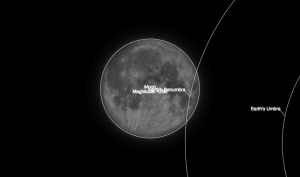
This total eclipse is visible in North America, Asia, Europe, and Australia as well as parts of South America and Africa Those who reside in regions where the January 31, 2018 lunar eclipse is visible need to be vigilant about their activities. This is particularly so if you have planets natally placed in Ashlesha (particularly your ascendant, Moon, or Rahu) or are running a planetary cycle of Moon or Rahu. If the eclipse is not visible in your area, then just be mindful, but it’s fine partake in your normal activities.
This eclipse is being called a super blue blood moon eclipse. According to NASA, the January 31, 2018 lunar eclipse is from 2:51 AM to 8:08 AM in San Francisco, CA. In Mumbai, India, the eclipse is from 4:21 PM to 9:38 PM, though it will not be visible till after sunset at 6:26 PM. Please check the NASA website to learn what times the eclipse occurs in your region.
Vedamurti Shri Vivek Shastri Godbole has spoken about the power of eclipses. He is a 15th generation Brahmin and scholar who has imbibed the Vedic scriptures. “The eclipses affect our mind and and our physical body. The scriptures state that eclipses create financial or physical problems and sometimes new diseases. There can also be natural disasters around the time of an eclipse. This is why people should not look at the eclipse.”
Recommended practices for the January 31, 2018 lunar eclipse:
- Do not look at the eclipse. Stay inside for the duration of the eclipse and close your blinds.
- Bathe before and after a visible eclipse.
- Ideally do not eat 12 hours before the eclipse (or at least do not eat during the eclipse).
- Do not drink anything 3 hours before a lunar eclipse or during the eclipse.
- Focus on your mantra during this eclipse. If you do not have a mantra, then chant “Om”.
- Do not expose food to the rays of the Sun or Moon during the eclipse.
- Be of service or volunteer near the day of the eclipse (but not during the timing of the visible eclipse). You can also perform some charitable act that day.
For pregnant women, children, the elderly, and those with medical problems, they do not have to strictly adhere to the non-eating or drinking guidelines, but should prioritize their health.
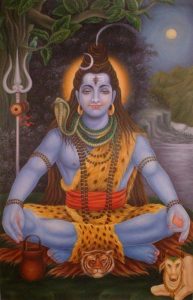
The lunar eclipse is connoted with Lord Shiva, since he is depicted with a crescent Moon on his forehead. It is beneficial to chant a Shiva mantra during a lunar eclipse. Vedamurti Shri Vivek Godbole has suggested that you can chant a Shiva mantra you are familiar with. Other chants which are powerful to perform during a lunar eclipse are the Chandi path (Durga Sapta Shlokhi), Shri Rudram, the Purusha Suktam, or the Guru Gita. Another mantra you may chant is Om Namo Bhagavate Vasudevaya. As you chant during the eclipse, the mantra becomes siddha or perfected. Chant for at least 15 to 30 minutes during the eclipse.
In Vedic astrology, or Jyotish, the Moon represents the manas or our emotional state. Jyotish is a lunar based system, so we give primary importance to the Moon. Metaphorically, our emotions may get clouded.
Jyotish’s sister science, Ayurveda, traditionally uses the herbs Brahmi or Gotu Kola or Bacopa to strengthen our mental faculties.
World events and eclipses
A primary reason why you shouldn’t gaze at eclipses is due to current world events. Whatever part of the world you reside in, you’ve witnessed instability. There’s been political unrest, natural disasters, and acts of terror. These types of events get magnified near eclipses. They may not happen on the same day as the eclipse, but they set the stage for more problematic events.
We can harness the powerful energy of the eclipse and direct it towards something more noble and uplifting. Use the time to focus on peace, do a spiritual practice, chant a mantra, pray, do a visualization, or whatever resonates with you. Imagine the powerful energetic effect which could manifest if millions were focusing on peace at the same time.
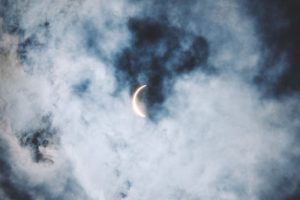 For those of you who claim not to believe in astrology, you likely believe in astronomy. Eclipses are an astronomical phenomena. Astrology and astronomy go hand in hand. Jyotish actually translates as “Vedic astrology and astronomy”. Astrology is based on the movement of planets across the zodiac. This includes tracking new and full Moons. Astrologers interpret the meaning of these planetary transits. They utilize astronomy to determine where the planets are at any given time. These details are then overlaid with the placement of the planets in any individual’s birth chart.
For those of you who claim not to believe in astrology, you likely believe in astronomy. Eclipses are an astronomical phenomena. Astrology and astronomy go hand in hand. Jyotish actually translates as “Vedic astrology and astronomy”. Astrology is based on the movement of planets across the zodiac. This includes tracking new and full Moons. Astrologers interpret the meaning of these planetary transits. They utilize astronomy to determine where the planets are at any given time. These details are then overlaid with the placement of the planets in any individual’s birth chart.
If you still choose to look at the January 31, 2018 lunar eclipse or must be outdoors, please do so mindfully and safely. Focus on your internal state of mind rather than just the events in the sky. Connect to harmony and peace. Maintain your inner state, for the benefit of all.
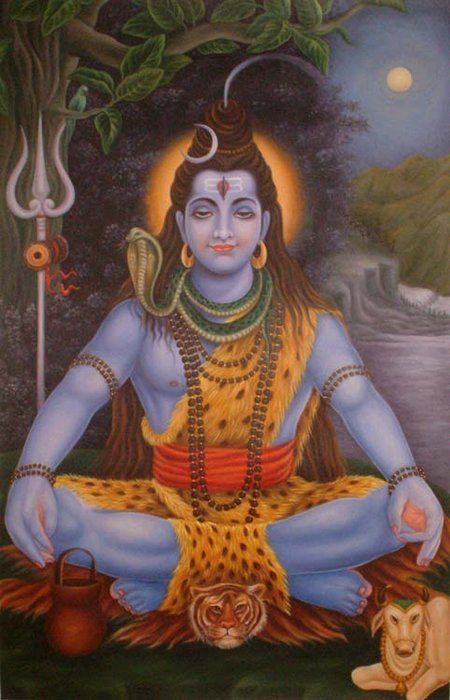
Recent Comments
http://kris
February 3, 2018 at 11:28 aminformative as always!
http://Visvabalan%20Ramasamy
January 31, 2018 at 2:52 amJai Sai Ram,
May the world be a more peaceful and joyful ever after.
Thank you for the explanations and the suggestions, may it give all the readers more confidence and strength.
Regards
Visva Balan
http://vijay
January 30, 2018 at 5:01 amThanks for the information
http://Narayan%20Shiarella
January 28, 2018 at 8:18 pmThank You 🕉❤🕉❤🕉❤
Comments are closed.